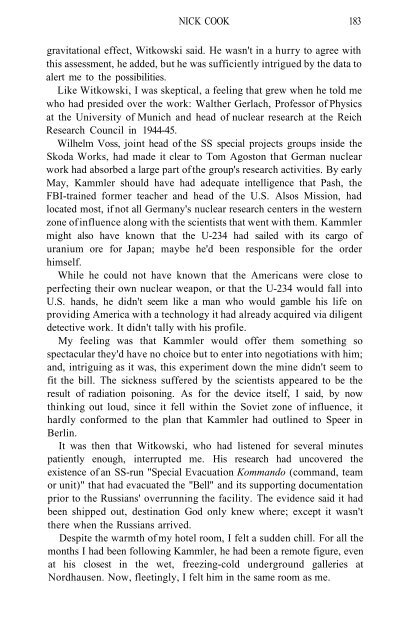ScienceDirect - Technol Rep Tohoku Univ ... - Garryck Osborne
ScienceDirect - Technol Rep Tohoku Univ ... - Garryck Osborne
ScienceDirect - Technol Rep Tohoku Univ ... - Garryck Osborne
You also want an ePaper? Increase the reach of your titles
YUMPU automatically turns print PDFs into web optimized ePapers that Google loves.
NICK COOK 183<br />
gravitational effect, Witkowski said. He wasn't in a hurry to agree with<br />
this assessment, he added, but he was sufficiently intrigued by the data to<br />
alert me to the possibilities.<br />
Like Witkowski, I was skeptical, a feeling that grew when he told me<br />
who had presided over the work: Walther Gerlach, Professor of Physics<br />
at the <strong>Univ</strong>ersity of Munich and head of nuclear research at the Reich<br />
Research Council in 1944-45.<br />
Wilhelm Voss, joint head of the SS special projects groups inside the<br />
Skoda Works, had made it clear to Tom Agoston that German nuclear<br />
work had absorbed a large part of the group's research activities. By early<br />
May, Kammler should have had adequate intelligence that Pash, the<br />
FBI-trained former teacher and head of the U.S. Alsos Mission, had<br />
located most, if not all Germany's nuclear research centers in the western<br />
zone of influence along with the scientists that went with them. Kammler<br />
might also have known that the U-234 had sailed with its cargo of<br />
uranium ore for Japan; maybe he'd been responsible for the order<br />
himself.<br />
While he could not have known that the Americans were close to<br />
perfecting their own nuclear weapon, or that the U-234 would fall into<br />
U.S. hands, he didn't seem like a man who would gamble his life on<br />
providing America with a technology it had already acquired via diligent<br />
detective work. It didn't tally with his profile.<br />
My feeling was that Kammler would offer them something so<br />
spectacular they'd have no choice but to enter into negotiations with him;<br />
and, intriguing as it was, this experiment down the mine didn't seem to<br />
fit the bill. The sickness suffered by the scientists appeared to be the<br />
result of radiation poisoning. As for the device itself, I said, by now<br />
thinking out loud, since it fell within the Soviet zone of influence, it<br />
hardly conformed to the plan that Kammler had outlined to Speer in<br />
Berlin.<br />
It was then that Witkowski, who had listened for several minutes<br />
patiently enough, interrupted me. His research had uncovered the<br />
existence of an SS-run "Special Evacuation Kommando (command, team<br />
or unit)" that had evacuated the "Bell" and its supporting documentation<br />
prior to the Russians' overrunning the facility. The evidence said it had<br />
been shipped out, destination God only knew where; except it wasn't<br />
there when the Russians arrived.<br />
Despite the warmth of my hotel room, I felt a sudden chill. For all the<br />
months I had been following Kammler, he had been a remote figure, even<br />
at his closest in the wet, freezing-cold underground galleries at<br />
Nordhausen. Now, fleetingly, I felt him in the same room as me.


